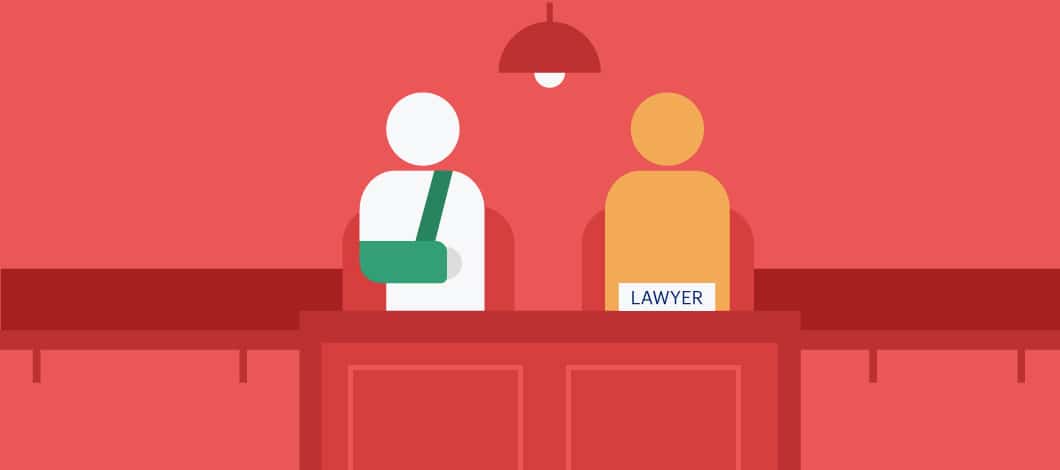Business lawsuit insurance is crucial. The bottom line is it can protect you from financial catastrophe.
Here’s what you need to know about different types of coverage:
- General liability insurance
- Worker compensation insurance
- Employer liability insurance
- Product liability insurance
- Professional liability (errors and omissions, or O&E) insurance
- Employment practices liability insurance
- Cyber liability insurance
- Commercial umbrella insurance (business owner’s policy)
Learn why you need insurance against lawsuit risks and what types of lawsuit insurance are available.
Why Do I Need Business Lawsuit Insurance?
If you run a business, you’re vulnerable to many legal risks. Consider the following scenarios:
- An employee falls off a broken ladder while stocking inventory, breaking their neck and suffering paralysis, and they blame you and file for damages
- An elderly customer in your store trips on a loose rug and breaks a hip, requiring hospitalization and rehabilitation so they can walk again, and a lawyer advises them to sue you
- A customer purchases a defective product that malfunctions and causes the death of their child, and they file a wrongful death claim
- A client follows your professional advice and suffers financial loss, which they claim is your responsibility
- An employee who was terminated claims that the firing was motivated by discrimination and sues you
- Your customer database is breached and customer identities are stolen, prompting an attorney representing them to file a class-action lawsuit
Situations such as this can cause a financial nightmare for your company. For example, the cost of a worker compensation claim settlement typically ranges from $2,000 to $40,000, averaging $20,000, according to law firm Hollington Brown. In some cases, costs may run much higher. A Buffalo roofer who suffered disabling injuries after falling 30 feet onto a concrete floor was recently awarded a settlement of $9.5 million.
Depending on how your business structure is set up and what type of claim is involved, you may even be personally liable for some claims, jeopardizing your personal finances as well as your company.
You’re in business to make money, not expose yourself to major financial risks. You need the right kind of business insurance to protect your profits.
Business Insurance: What Does It Cover?
What does business liability insurance cover? Different types of business insurance provide different types of coverage. Some merely protect you from economic loss in the event of a financial disruption, while others protect you from liability as well as accompanying financial loss. It’s important to make sure your insurance plan includes all the types of liability coverage you need.
Here’s a breakdown of the major types of business insurance which include some type of liability protection. Note that each of these types of insurance typically shares features common to insurance policies, such as deductibles and coverage limits. Study the details of your policy for specifics.

What Does General Liability Insurance Cover?
General liability insurance, also known as commercial general liability insurance or business liability insurance, protects you against claims from nonemployees arising from certain types of personal injury or property loss.
Coverage typically includes:
- Bodily injury to nonworker third parties, such as a customer sustaining an injury on your premises
- Medical bills resulting from bodily injury
- Property damage, such as damage to a customer’s car on your parking lot
- Damage caused by defective products
- Reputational harm claims, such as a libel suit by a party claiming information on your website harmed their business
- Advertising injuries, such as another brand claiming you infringed on their trademark
- Legal costs to defend your business against lawsuits
- Judgments and settlements arising from lawsuits
The exact scope of your general liability coverage will vary with your policy’s precise terms. Some policies may not include all the items mentioned above. It’s best to talk to your insurance agent for clarification.
While general liability coverage encompasses a wide range of claims, it doesn’t cover everything, including:
- Employee injuries, which are instead covered under worker compensation insurance
- Liability arising from professional mistakes, which is covered under professional liability insurance
- Damage or theft affecting commercial property owned by your business, which may be covered under commercial property insurance
- Damage or theft affecting commercial vehicles used by your business, which can be covered under commercial auto insurance
Some insurance providers may offer types of coverage that combine general liability insurance with some of these excluded items.
What Does Worker Compensation Insurance Cover?
Worker compensation insurance protects you against claims resulting from injuries or illnesses your employees suffer while working for you. It typically includes coverage for:
- Lost wages
- Medical bills
- Legal fees
- Support of families who suffer the loss of a loved one because of a work-related injury of illness
Each state has its own requirements regarding worker compensation insurance. Normally, if you have employees, you are required to carry it. Check with your state’s department of labor or your insurance or legal professional about your state’s requirements.
Even if you aren’t required to carry worker compensation insurance, it may be in your best interests to do so. Some clients, vendors or contractors may want you to carry worker compensation insurance to avoid exposing them to liability.
What Does Employer’s Liability Insurance Cover?
Employer’s liability insurance, also known as employee injury insurance, resembles worker compensation insurance but provides a different range of coverage. With worker compensation insurance, the claimant does not need to demonstrate employer fault or negligence, only that they suffered injury or illness on the job. However, if the claimant regards the employer as liable because of negligence, they may decide to file a separate civil lawsuit for greater compensation instead of settling for worker compensation with your insurance company.
This can apply in cases where:
- You had a legal duty to protect your employee
- You neglected that duty by action or omission
- Your employee suffered harm or financial damages as a result of your negligence
Employer’s liability insurance protects you against claims under these circumstances. In some states, you may be required to carry both worker compensation and employer liability insurance.

What Does Product Liability Insurance Cover?
Product liability insurance protects your business against financial loss resulting from claims regarding use of one of your products.
The claim may involve a defective product, or it can be a case of an individual using a product incorrectly. You can even have a frivolous lawsuit brought against you by someone who simply didn’t like your product. They may not win the suit, but you may still get stuck with legal bills.
Product liability insurance typically covers:
- Injury or illness caused by your product
- Property damage caused by your product
- Legal fees
The product involved can be a product you made, distributed or sold. This type of coverage is widely used by manufacturers, retailers and contractors working in trades such as construction.
Product liability insurance doesn’t cover accidents involving customers, which fall under general liability insurance, or injuries to workers, which fall under worker compensation insurance or employer’s liability insurance. It also doesn’t cover costs associated with product recalls. You can purchase a separate type of insurance called product recall insurance.
What Does Professional Liability Insurance Cover?
Professional liability insurance, known as O&E insurance or professional indemnity insurance in some industries, protects you from losses over claims resulting from your professional advice.
Claims can be made against you for alleged:
- Bad advice
- Negligence
- Misrepresentation
Professional liability insurance is most widely used in industries that involve directly providing professional services or giving professional advice to clients. For example, health-care providers, accountants and computer consultants often have professional liability coverage. In some states, coverage is mandatory for certain industries.
What Does Employment Practices Liability Insurance Cover?
Employment practices liability insurance protects you from losses resulting from claims where an employee accuses you of illegal practices such as:
- Wrongful termination, discipline or demotion
- Discrimination
- Harassment
- Retaliation
- Failing to provide qualified medical or family leave under the Family and Medical Leave Act
In these types of situations, employment practices liability insurance protects you from costs associated with legal fees and settlements.
What Does Cyber Liability Insurance Cover?
Cyber liability insurance covers losses over claims resulting from disruptions of your company’s computer network, such as data loss and data breaches.
It can cover costs such as:
- Legal fees
- Settlements
- Regulatory fines
Cyber liability insurance is distinct from data breach insurance, which covers financial losses over cyber disruptions that don’t necessarily involve liability claims. For instance, data breach insurance might compensate you for the costs of computer forensics investigation, credit monitoring and lost business. Some policies may combine cyber liability insurance and data breach insurance.
What Does Commercial Umbrella Insurance Cover?
A commercial umbrella policy, also known as a business owners policy (BOP), expands the scope of popular types of liability insurance by increasing their limits or combining them with other types of commercial insurance. For example, an umbrella policy might expand your general liability insurance to a higher limit, or it might add commercial auto insurance.
Commercial umbrella insurance typically enhances:
- General liability insurance
- Worker compensation insurance
- Employer’s liability insurance
- Commercial auto insurance
The exact scope of your umbrella coverage will vary with your policy.
Get Complete Business Insurance Coverage to Protect Your Profits
An incomplete insurance package leaves you open to potentially catastrophic financial risks that can bankrupt your business and even your personal finances. Make sure that your coverage includes the best protection business insurance can provide.
Talk to your insurance provider about what types of coverage are appropriate for you. If you need financing to cover your insurance costs, consider applying for a business line of credit or another type of small business financing.










